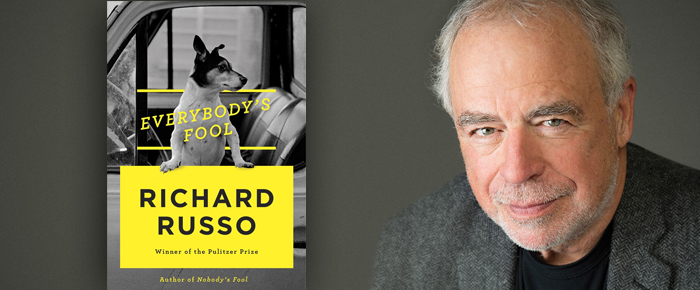
By Heidi Simmons
—–
Everybody’s Fool
by Richard Russo
Fiction
—–
There is a certain allure to small town living. Knowing your neighbors, making a difference and building a community are appealing to many. But there are drawbacks if you love privacy and anonymity. In Richard Russo’s Everybody’s Fool (Knopf, 498 pages) a community’s survival hinges on overcoming its weaknesses and discovering its strengths.
The story takes place in old North Bath, New York, a city in serious decline. It has been in a downward spiral for over a decade, while its sister city, Schuyler Springs, thrives.
Bath’s police chief is Doug Raymer and he can’t figure out why he’s chief or how he was elected. Before becoming chief, as a new police officer, he accidentally fired his weapon at an unarmed man. The community won’t let him forget that he is indeed a fool.
Raymer is depressed. He hates his job and wants to quit. He has no friends, no life and his wife, Becka, died in a freak accident the very day she was leaving him for another man. Obsessed with finding her lover, Raymer has only one clue – a garage door opener he found in her car after her death. Driving around neighborhoods “clicking” away, he hopes to discover the man who stole his wife’s affections.
Everyone but Raymer knows with whom Becka was having an affair making him even more of a fool.
While standing at the gravesite of a judge who never liked him, and in front of the entire community and only steps away from his wife’s resting place, Raymer faints into the hole. When he comes to, he is in the hospital with a concussion and broken nose. But that’s not the main problem, the garage opener is missing and Raymer is certain it is in the covered earth of the judge’s grave.
Recruiting some unlikely pals, in fact people he doesn’t even like, Raymer asks for help unearthing the garage opener. Over the next 18 hours, his job just gets worse. The power goes out across the city after a local construction company cuts the main lines, a deadly snake is on the loose forcing the evacuation of the tenement he lives in and the local ne’er-do-well is out of the pen seeking revenge.
As he handles the chaos, Everybody’s Fool, Raymer, discovers maybe he is good at his job. But if he is to succeed, he must get over his self-loathing and pain, and realize there are people who love and care about him. Although dysfunctional, the close-knit community works together to solve the problems at hand.
Everybody’s Fool is a sequel to author Russo’s 1993 Nobody’s Fool. But it stands alone as an entertaining and fresh read. The characters are colorful, quirky and significantly challenged by their lifestyle. If you have read Nobody’s Fool then Everybody’s Fool is a delicious treat to revisit these characters after twenty plus years.
The entire story takes place over two days, which makes for an engaging read. But, the first 100 pages are slow as the characters are introduced. Once you’re passed meeting these people and get to know their circumstances and a bit of their back-stories, the novel takes off. Part of the problem in the beginning is Russo breaks up the narrative as he jumps from character to character in a nonlinear way.
Perhaps the author thought it might make the story more suspenseful disseminating some information here and there to complicate the protagonist’s dilemma. Or it was simply too great a challenge for Russo to tell how a half a dozen different characters are connected to the plot. But as the action and local dramas unfold, the time frame mostly catches up and the bigger picture emerges making Everybody’s Fool hard to put down.
I especially liked that many of the characters all had a beloved English teacher, Miss Beryl. She is so adored by the community they are going to name a park in her memory. Several characters harken back to her class, the essays they wrote and the lessons they learned not only in the classroom, but also about life itself.
Nobody’s Fool would be a plus to read before reading Everybody’s Fool but it is not necessary. However, I imagine it would make the story more compelling after so much time has gone by to see if and how much these characters have matured over the decades.
My guess is they all have, because the ending is so nicely tied up as the characters come to realize it is better for everyone, the entire community, when you can forgive and let go rather than hold grudges and nurture hurt feelings. After all, healthy communities, whether big or small, are made up of healthy and happy citizens.












































